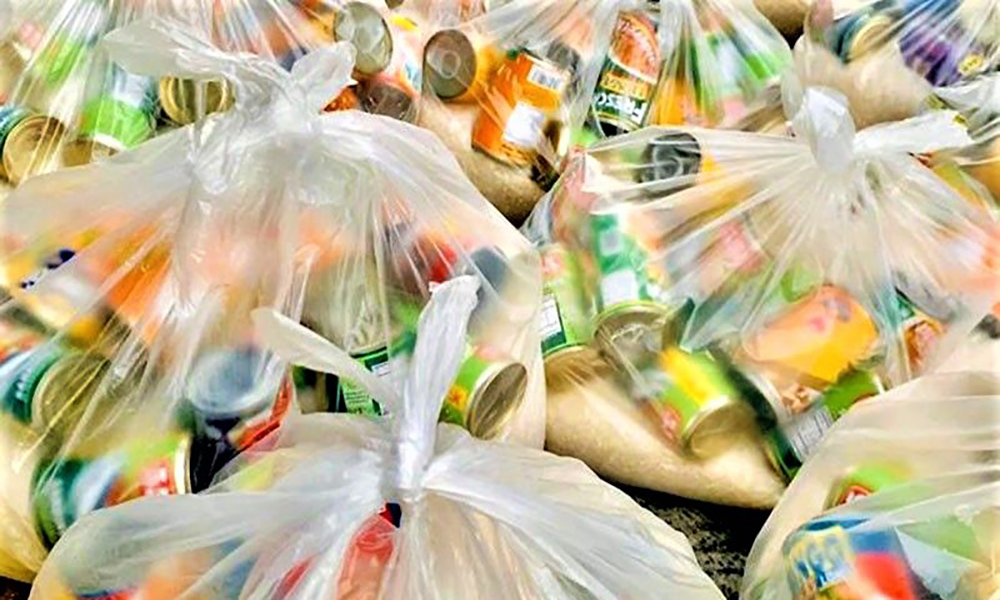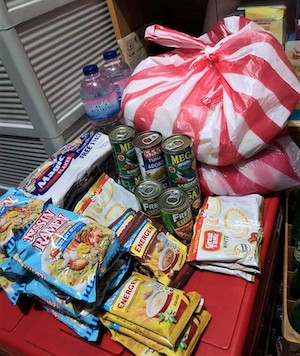
The ayuda syndrome

By Rex Catubig
THEY are the calamity staple. Once referred to as “relief”, they have since mutated into the colloquial “ayuda” as food aid is called—a package consisting of a bag of rice, canned goods, noodles, coffee sachets, and the like—depending on the local government’s resources and “diskarte” or enterprise in getting donations from private or civic groups.
Meant as palliative for the plight of calamity victims, they fall under the second requisite of the tripartite necessities in normal life: roof above the head, food on the table, and clothes on the back.
 The ayuda pack includes canned comfort food beloved to our “kabaleyan” that have stood the test of time. Aside from their viability (they do not spoil easily) and ease of consumption (they do not need cooking), they are not begrudged and branded as discriminatory or “for the poor only” as the wannabe rich and the verily poor enjoy eating them.
The ayuda pack includes canned comfort food beloved to our “kabaleyan” that have stood the test of time. Aside from their viability (they do not spoil easily) and ease of consumption (they do not need cooking), they are not begrudged and branded as discriminatory or “for the poor only” as the wannabe rich and the verily poor enjoy eating them.
In fact, among the items, canned corned beef and sardines in tomato sauce are undoubtedly the Filipino nation’s top favorite convenience food. They’re the “wish upon a star” stellar alternate dish when there’s no food on the table. “Manabri ki lay carne norte” or “Manlukas ki lay sardinas“, is commonly heard in households. Though now, they have graduated by dint of hard luck as the main dish—prepared in the most creative ways to cope with hunger games for most families in daily combat with how to make both ends meet.
Back in the day, there was nothing apologetic nor condescending about opening these canned foods. It was basically a matter of convenience when cooking was not a choice. Or indulgence, when the craving for “stateside” hit you: note that it was Emery Corned Beef or Portola Sardines—both imported but readily available on the sari-sari shelves of Nana Pacing. Or maybe because the food for the day was gone in a whiff and only an aftertaste was left for dinner.
Contrast that today where food is in short supply not only during a calamity. Where there is day-by-day struggle to cope with the incredible shortage of basic condiments one sorely needs to make a measly meal palatable. Where in a country that pioneered rice technology, there is never enough harvest to feed the people, resulting in the unprecedented rise in its price. Ironically, for most, rice is what a full meal consists of and barely nothing else, sometimes literally with just a pinch of salt.
Thus, one is hard pressed to think that eating is basic, is essential to life—just in ordinary life. And if relief canned goods are ransom paid upon being subjected to dire straits.
It boggles the mind that as if the natural calamities are not bad enough, the unconscionable economic maelstrom that besets us, denigrates us to being feeble recipients of hand-outs and hand-me-down. Beggars and paupers, if you please.
Being ayuda recipients, we are being programmed to accept government incompetence as the biblical norm to be accepted with insipid faith. Even in the face of millions of confidential funds, we are not deemed worthy enough to be privy of crumbs. We are being conditioned to believe that opening a can of Ligo sardines or Bingo corned beef constitutes the ideal democratic mode of life. And enough to be grateful for.
But that culinary oppression could lead to social hypertension.









